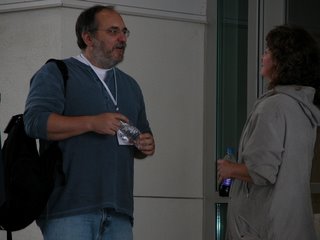Wanted: News organization with vision, guts, asbestos underwear and enormous brass balls, willing to hire free-thinking, outspoken tech-pioneer to serve as chief technology officer. Apply to Dave Winer, somewhere on the road to the future...Today on Scripting News, Dave runs an excellent list of suggestions for news organizations that want to master the transition to the new news. But the last graph made me sit up in my chair:
Disclaimer: I am looking for a job as CTO or Chief Scientist at a professional publisher that wants to make a strong transition to the new environment. So here I practice what I preach, I'm floating ideas in advance of using them.Dave has mentioned some interest in trying his hand at "professional" media before, but this really puts his goal right out there for the world. If I were the CEO of a media group, the availability of Dave Winer would be what football coaches like to call "a gut check." Do I really want to be the best, or am I more comfortable with the known, predictable and non-threatening?
 To put this in context, this is the equivalent of having Vincent Van Gogh apply for a vacancy in your graphic arts department. Sure, you could say that Vincent lacks Photoshop experience and move on to the next applicant. That would be the "safe" move. But "safe" seldom equals "great."
To put this in context, this is the equivalent of having Vincent Van Gogh apply for a vacancy in your graphic arts department. Sure, you could say that Vincent lacks Photoshop experience and move on to the next applicant. That would be the "safe" move. But "safe" seldom equals "great."From a typical corporate perspective, Dave would be a "difficult" employee. He wouldn't need your management team's validation to make him feel confident in his beliefs about technology and media. He wouldn't "stick to computers" when it comes to discussions of ethics and responsibility, so the newsroom had better be ready for some knockdowns. And fire him? The guy's a millionaire who does what interests him, with a blog audience that reaches the most influential readers in the tech world. So go ahead and fire him. Make his day.
But screw the typical corporate perspective. Even if you set aside the things on Dave's resume (including blogs, RSS, OPML, unconferences, podcasts, etc.) and just look at him as a modern technologist who "gets" media, the man is a compelling candidate with an obvious passion about improving the quality of news in society. He makes a point of speaking to groups of journalists not because it profits him, but because he's passionate about the subject and willing to engage with reporters and editors in an effort to spread the new gospel.
His reputation is brash, and there's no doubt that Dave sometimes chooses to confront differences publicly at moments when public confrontation is purely optional. He's a burly bear of a man who can be an intimidating presence, and to judge by comments around the Web, he is a polarizing figure, particularly in tech circles. Is he a bully? I don't believe so, and my personal experience is that he's always been more than fair -- helpful, even -- to me. But he doesn't make nice if he thinks you're wrong.
In other words, you don't hire Dave Winer if you doubt your courage, or if your commitment to being great and innovative is less than his. You hire Dave because you see in him an opportunity to take great risks and reap great rewards and make your mark on this Golden Age Moment in which we find ourselves. Because make no mistake: This IS the Golden Age of the Internet, the particular instant in which the tools have emerged and the path is clear and the answer has not yet been delivered, the moment when people with clear vision can invent and build and leave their mark. We are -- all of us -- making history.
Dave doesn't need to be someone's CTO. He doesn't need the money, the headaches, the meetings or the constraints. I suspect he wants this career change for one simple reason: he sees an opportunity to change the world in ways he thinks will make it better.
If there's a media company that wants the same thing, then let me introduce you to your next Chief Technology Officer...
